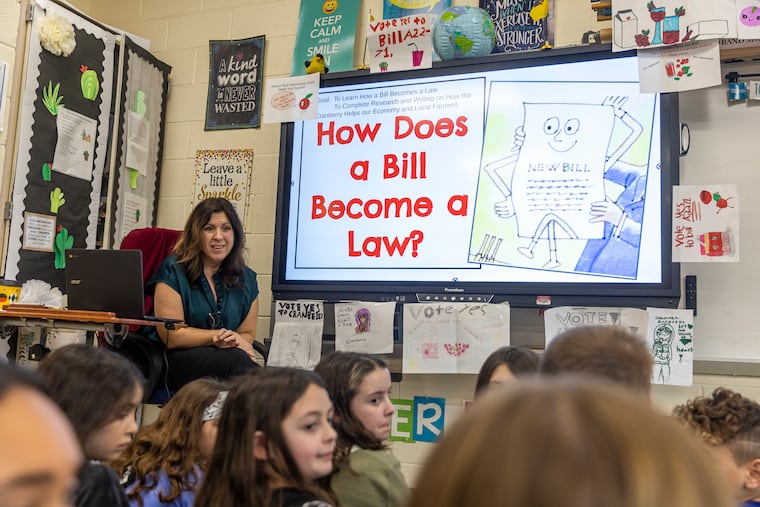South Jersey fourth graders pick up charge to make cranberry juice a state symbol
Their efforts started during a lesson on state symbols at Eleanor Rush Intermediate School in Cinnaminson.

There must be something special in the water (or juice?) in Erin Zarzycki’s fourth grade. For the second time, a group of her students is trying to persuade New Jersey lawmakers to make cranberry juice a state symbol.
Their project began in 2020 when students at Eleanor Rush Intermediate School in Cinnaminson became lobbyists — writing letters, visiting the Statehouse to learn how a bill becomes a law, and eventually persuading two lawmakers to sponsor their proposal.
But the legislative session ended without a vote on the bill, dashing their hopes. And the pandemic further put the legislation on a back burner. The class that got the juices flowing graduated, and now two years later are sixth graders in nearby Cinnaminson Middle School.
Now, the legislation has been reintroduced by Assemblywoman Carol Murphy (D., Burlington) with a new cosponsor, Sen. Fred Madden (D., Gloucester). And Zarzycki’s current batch of fourth graders is optimistic it will eventually make it into law this time.
“I’m excited about this bill,” Murphy said in an interview. “It’s getting our young folks to understand democracy and what a bill means. They advocated for this.”
Their efforts started during a lesson on state symbols, and Zarzycki’s former elementary students were surprised to learn that New Jersey doesn’t have a state beverage. They began brainstorming and soon rejected tomato juice — they didn’t think that would be popular — and turned down blueberry juice, too.
They ultimately selected cranberry juice to celebrate the state’s cranberry-growing heritage. New Jersey’s cranberry production ranks third in the country behind Wisconsin and Massachusetts with an annual harvest valued at $15.8 million.
“I think it’s cool,” said Anna Santara, 10. “In the future, people who will be learning about New Jersey will remember us.”
In a class this week, Zarzycki gave students an update on the status of the bill, which recently cleared the Assembly Agriculture and Food Security Committee. Both houses must approve it before it lands on the desk of Gov. Phil Murphy.
“I feel like the momentum is back,” Zarzycki said. “I think we’re going to get it done.”
Zarzycki said the original version of the bill has been amended slightly with some language changes. For example, it proposes to make cranberry juice the state juice, not the state “beverage.” Students agreed with the changes.
Sitting on the floor while they watched a Power Point presentation on a whiteboard, students eagerly fielded questions on how they could get involved in making laws. Some students, like Ben Lonardo, 10, said they want to tackle other topics: “Make gun violence less,” he said.
“Let’s make the kids from three years ago proud,” said another student, Hunter Mazzacano, 9.
The students sat in small groups to conduct research about cranberries, a tart berry grown first by the Lenni-Lenape people in South Jersey, who used it in remedies, food, and drinks. Most of the cranberries harvested in the state come from Ocean Spray Cooperative, which comprises more than 700 growers that produce bottled cranberry juice and cranberry sauce.
“I actually never tried it,” Avery Sanford, 9, sheepishly admitted. “Now that we’re learning this lesson, I think I’m going to try it.”
The students paired up to write letters to lawmakers urging them to support the bill. They also made posters to display on the classroom wall. Zarzycki plans to make a video to send to Trenton. In the pitch, Chiamaka Onyeneke and Quinn Coston, both 9, wrote:
“We all want cranberry juice to be our new state juice. This might be the first New Jersey state juice if this works.”
Murphy reintroduced another bill by a Camden County student that would establish blueberry cheesecake as a state muffin. (Laws designating the blueberry as the state fruit and Hadrosaurus foulkii as the state dinosaur were also proposed by students.)
Delize Patterson, of Voorhees, was 11 when she came up with the state muffin idea. Then a seventh grader, she researched it and recruited fellow members of Jack and Jill of America, a leadership organization founded by Black mothers during the Depression, to organize a statewide tasting contest of several muffin varieties.
The judges, which included Murphy, chose the blueberry cheesecake muffin. Patterson, now 17 and a senior at Eastern Regional High School considering a career in law, says she has learned a lot about politics.
“I’ve been blessed to be a part of this,” Patterson said. “I just wanted to do something that would affect my community.”
Murphy said she remains committed to getting both bills passed. She rejected criticism from some that she should focus on more urgent matters.
“I take a lot of pride in people asking me to help them,” Murphy said.